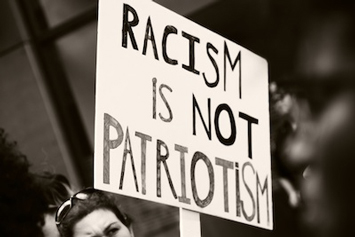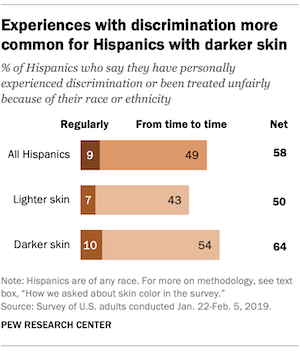Red, White and Racially Skewed
By The Final Call | Last updated: Jul 9, 2019 - 1:13:06 AMWhat's your opinion on this article?
America celebrated another birthday July 4 and while her president and others were touting the blessings and benefits of the “greatest country in world history,” the glaring contradictions in society cannot be ignored.

Despite all the fine words and feel good speeches, America has yet to atone for her past sins, let alone put an end to current oppression.
But the question of race and racial progress is not one to be determined by the children of the nation’s former slavemasters but by those who are the children of the slaves and those who find themselves caught up in America’s oppressive racial traps.
Consider a Pew Center study issued July 2 which found, “Hispanics with darker skin are more likely to experience discrimination than those with lighter skin.”
While Hispanics may be categorized as either White or Black, those who lack fair skin are quickly accorded an “honorary” Black card when it comes to mistreatment. “About six-in-ten U.S. Hispanic adults (58 percent) say they have experienced discrimination or been treated unfairly because of their race or ethnicity, though their experiences vary by skin color,” according to the Pew Research Center.
“About two-thirds of Hispanics with darker skin colors (64 percent) report they have experienced discrimination or been treated unfairly regularly or from time to time, compared with half of those with a lighter skin tone. These differences in experiences with discrimination hold even after controlling for characteristics such as gender, age, education and whether they were born in the U.S. or abroad,” said the survey.
“Latinos with darker skin are more likely than those with lighter skin to report a specific incident of discrimination. A majority of Latinos with a darker skin color (55 percent) say that, because of their race or ethnicity, people have acted as if they were not smart, compared with 36 percent of Latinos with a lighter skin color. Similarly, about half of Latinos with darker skin (53 percent) say they have been subject to slurs or jokes, compared with about a third of those with a lighter skin color (34 percent).”
The survey asked Black and Hispanic respondents to “identify the skin tone that best resembles their own … . Respondents were shown five skin tones that ranged from fair to dark,” the report explained.

The Hispanic respondents were then placed in two categories, a “lighter skin” group included those who chose the lightest skin tone, and the “darker skin” group included those who chose the four darkest skin tones.
“By contrast, Hispanics with a lighter skin tone have had experiences with discrimination that are similar to those of non-Hispanic whites. Among both groups, about a quarter say people have acted as if they were suspicious of them, roughly a third have been subject to slurs or jokes, and about two-in-ten (19 percent) say they have been treated poorly in hiring, pay or promotion. It is important to note that about half of Hispanics (52 percent) identify their race as white, a share that increases to about two-thirds (68 percent) among those with the lightest skin color.
“While darker skin color is associated with more frequent experiences with discrimination among Hispanics, this link is less clear among black adults. For blacks, gender and education had a greater effect on their experiences with specific incidents of discrimination than their skin color,” said the Pew Research Center.
Meanwhile a Pew Center survey from earlier this year found racism and discrimination persistent problems for Black folk. More than four-in-ten adults said the country hasn’t made enough progress toward racial equality, and there is some skepticism, particularly among Blacks, that Black people will ever have equal rights with Whites, the survey found.
“About six-in-ten Americans (58 percent) say race relations in the U.S. are bad, and of those, few see them improving. Some 56 percent think the president has made race relations worse; just 15 percent say he has improved race relations and another 13 percent say he has tried but failed to make progress on this issue. In addition, roughly two-thirds say it’s become more common for people to express racist views since Trump became president,” the survey, which was released in April, discovered.
“Blacks are particularly gloomy about the country’s racial progress. More than eight-in-ten Black adults say the legacy of slavery affects the position of Black people in America today, including 59 percent who say it affects it a great deal. About eight-in-ten Blacks (78 percent) say the country hasn’t gone far enough when it comes to giving Black people equal rights with whites, and fully half say it’s unlikely that the country will eventually achieve racial equality.
“Americans see disadvantages for Blacks and Hispanics in the U.S. A majority of all adults (56 percent) say being Black hurts people’s ability to get ahead at least a little, and 51 percent say the same about being Hispanic. In contrast, 59 percent say being white helps people’s ability to get ahead. Views about the impact of being Asian or Native American are more mixed.
“Blacks, Hispanics and Asians are more likely than whites to say being white helps people’s ability to get ahead at least a little. Among whites, those who are more educated, as well as those who identify with or lean toward the Democratic Party, are particularly likely to see advantages to being white,” said the survey.
So despite talk to the contrary and America’s self-serving accolades, the color that matters most when it comes to enjoying freedom, getting justice and experiencing equality in the United States remains White.
INSIDE STORIES AND REVIEWS
-
-
About Harriett ... and the Negro Hollywood Road Show
By Rabiah Muhammad, Guest Columnist » Full Story -
Skepticism greets Jay-Z, NFL talk of inspiring change
By Bryan 18X Crawford and Richard B. Muhammad The Final Call Newspaper @TheFinalCall » Full Story -
The painful problem of Black girls and suicide
By Charlene Muhammad -National Correspondent- » Full Story -
Exploitation of Innocence - Report: Perceptions, policies hurting Black girls
By Charlene Muhammad -National Correspondent- » Full Story -
Big Ballin: Big ideas fuel a father’s Big Baller Brand and brash business sense
By Bryan Crawford -Contributing Writer- » Full Story






 Click Here Stay Connected!
Click Here Stay Connected!








